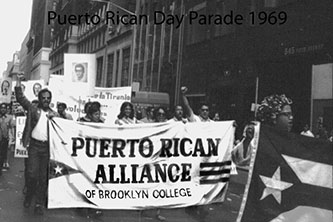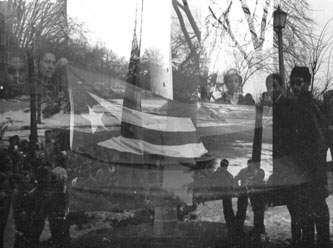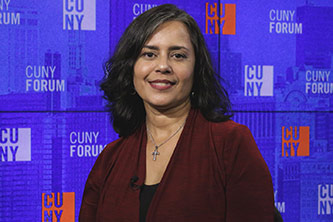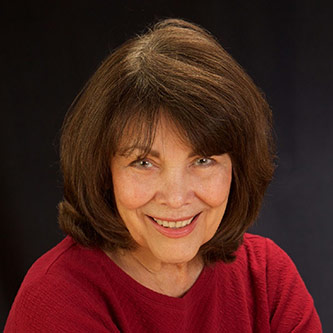Puerto Rican and Latino Studies Department 50th Anniversary: Fall 2020 Events

The Puerto Rican Alliance of Brooklyn College marching in the annual Puerto Rican Day Parade, 1969. (Photo credit. Antonio Nieves ’72)
The Department of Puerto Rican and Latino Studies has had a very busy fall 2020 celebrating the 50 years since its founding as a department in 1970. In spite of COVID-19 restrictions, the members of the department, their affiliated organizations, alumni, and current students highlighted the department and celebrated its contributions to progressive activism and the academy in a series of events including a documentary screening, media interviews, and virtual panels as well as an upcoming book.
Naturally, the department’s 15th Annual Possible Dream: Latinx Arts, Communities, and Leadership Encuentro series of events focused on the department’s 50th anniversary. The opening event was a panel discussion on October 6, "¡Basta Ya! (Enough Already!), What a Few Puerto Rican Students Did That Irreversibly Changed the Ivory Tower." The panel comprised Virginia Sánchez Korrol, chair from 1989 to 2004, and María Pérez y González, chair from 2004 to 2019. The two former chairs were joined by Professor Emeritus Antonio Nadal '68, and Gisely Colón López, adjunct lecturer and Brooklyn College salutatorian for the Class of 2015, on a on NY1 segment later that month to discuss the department's Hispanic/Latinx Heritage Month celebration of the 50th anniversary of Puerto Rican studies at Brooklyn College.
The panelists summarized the history of the department, stressing the role of the BC Puerto Rican Alliance (the oldest continuous LatinX student group at CUNY) in pushing for more courses and professors that reflected the culture of the ever-growing numbers of New Yorkers of Puerto Rican heritage who were seeking greater educational opportunities at CUNY at that time. Formed during the Civil Rights Movement of the 1960s, students in the Puerto Rican Alliance, in close cooperation with the Black League of Afro-American Collegians (BLAC), organized to demand more representation in the academy, first through the founding of the department in 1970 and then the department's fight to choose its own leadership. Professor Nadal, who was one of those students, pointed out, "It was literally from the ground up. It wasn't top down. The administrations were not open to that kind of thing. The whole idea was to offer courses through traditional departments and also have a cultural presence on campus." Nadal, who went on to teach at the college, recalled the headline-making protests on campus that led to the creation of first the Puerto Rican Alliance in 1968, the Department of Puerto Rican Studies in 1970, and the right to elect its own chair in 1974. "We had tremendous opposition,” said Nadal. “There were arrests. A number of takeovers of the president's office, the takeover of the registrar's office. It wasn't easy." Continuing its progressive and inclusive tradition, in 1998 the department changed its name to Puerto Rican and Latino Studies (PRLS) to reflect an ever more diverse Hispanic student body.

Black and Puerto Rican students took turns flying the Puerto Rican and Black Liberation flag from the Brooklyn College flagpole, circa 1969. (Photo credit Antonio Nieves '72)
The cultural struggle on campus and the origins of Puerto Rican Studies at Brooklyn College were captured in a documentary, Making the Impossible, Possible, which debuted on November 19 from 7 to 8:30 p.m. The event was sponsored by the Alliance for Puerto Rican Education and Empowerment (APREE), a group composed mostly of Brooklyn College alumni founders of the department, who put together both the documentary and post screening Q&A session. The screening had over 500 registrants and a full house of over 300 attendees who watched the movie and participated in the program. The organizers reported being thrilled that they accomplished their goals of reconnecting with old friends, and making new ones.
Media coverage of the 50th anniversary has been extensive. Daniel Vázquez Sanabria, Puerto Rican Alliance president and Mellon Mays Undergraduate Fellow, was interviewed by the Brooklyn College Vanguard newspaper, and Good Morning Nueva York on WBAI Radio. Professor Emeritus Antonio Nadal was featured on 1010 WINS radio in a Hispanic Heritage Month celebration story on the department’s 50th anniversary. The media coverage included the announcement that Professor Emerita Virginia Sánchez Korrol, former department chair, has been awarded the 2020 Herbert H. Lehman Prize for Distinguished Service in New York History from the New York Academy of History.

María Pérez y González, former PRLS chair (2004–19).

Virginia Sánchez Korrol, Professor Emerita, former PRLS chairperson (1989-2004)
Also announced this fall is that a new book, The 50 Years of Puerto Rican Studies in CUNY (final title tbd), co-edited by María E. Pérez y González and Virginia Sánchez Korrol, is in the works.
The book will feature Puerto Rican Studies Department retrospectives as well as critical essays in the social sciences, bilingual education, the media, recollections from retired and active professors, and commentary reflecting alumna-staff-faculty perspectives. It will highlight the field's groundbreaking interdisciplinary focus on the intersectionalities of race, culture, gender, power, and class; its forging of anti-racist pedagogy, bilingual education, and a decolonialized curriculum; its influence on the "Ivory Tower"; its birthing of academic journals, the Centro de Estudios Puertorriqueños (Center for Puerto Rican Studies), and the Puerto Rican Studies Association; its mission to study the Puerto Rican diasporic experience as connected to the Caribbean and Latin America; its survival tactics in the face of austerity and elimination; its current status; and its future in the 21st century. Authors include well-established scholars of Puerto Rican studies as well as more recent scholars. Contributors will include Edna Acosta-Belén, Christine Bose, Regina Bernard-Carreño, Pedro Cabán, Gisely Colón López, Juan González, Milga Morales Nadal, Antonio Nadal, María Pérez y González, Conor Tomás Reed, Virginia Sánchez Korrol, Andrés Torres, and Jesse Vázquez. It is expected to be published in 2021 by Centro Press. The book will also have a linked Digital Archives webpage to collect CUNY-related as well as global Puerto Rican Studies information.
As Professor Colón López pointed out in the NY1 interview, the struggle continues. As she noted, "We're still fighting budget cuts. We're still fighting for valid space within academia, within certain statures of communities. We're still working on policies." Indeed, in its research, support for students and progressive activism, the department is still building on the legacy of those pioneering students 50 years ago.






